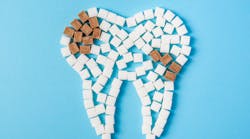Periodontists most commonly discuss tooth decay which, if left untreated, can lead to gum disease and potential tooth loss. But tooth erosion, also known as acid erosion, can become an issue as well.
Tooth erosion is the wearing away or damage to the outermost layer of the teeth, the enamel, that protects our teeth. If the tooth enamel is weakened, the underlying dentin layer can be exposed, resulting in yellow-looking teeth and/or worn-down, odd-shaped teeth. You may experience indentations in your teeth, called cupping. While tooth erosion is different from tooth decay, the more common condition that results from oral bacteria, it’s still problematic.
What causes tooth erosion?
Tooth erosion is progressive and non-reversible since enamel, which is a mineral, does not grow back. The situation can cause you to feel sensitivity when drinking hot or cold beverages. Additionally, your front teeth may develop an almost transparent appearance.
The following issues can also affect tooth erosion:
Stomach acid
Repeated battles with stomach upsets can weaken the natural enamel on your teeth. Dentists can often recognize reflux and GERD sufferers from this tooth erosion. Individuals with bulimia nervosa unfortunately can also experience tooth erosion as a result of purging, which can cause stomach acid to erode the tooth enamel.
Grinding your teeth
Grinding or gnashing your teeth, known as bruxism, can wear down enamel. Nightguards (also known as mouthguards) can be custom-made by your dental professional to help protect your teeth.
Acid and sugar consumption
Sugary snacks, especially those that stick to the teeth, can damage enamel. Starchy snacks like potato chips or crackers also turn to acid. Minimizing consumption of carbonated beverages, a major culprit, can help. Other liquids that can wear away tooth enamel are sports drinks, citrus juices, and beer. Drinking from a straw helps minimize damage. Drinking calcium-rich milk can help neutralize the acid, and chewing sugar-free gum with xylitol can produce saliva to counteract the acid exposure.
Improper bedtime routines
Your mouth is more likely to fall open if you’re sleeping with soft pillows. Sleeping with an open mouth creates drier mouths, allowing more acid to be created which can potentially damage teeth.
What goes on in a sleeping mouth
Oral hygiene
While we always encourage brushing after a meal, timing is significant. It’s better to wait an hour or so after eating acidic foods. By doing so, you allow the natural saliva in your mouth to help wash away the acid. Products approved by the American Dental Association (ADA) will help protect against enamel erosion. Following proper brushing techniques is important since brushing too hard can not only wear down tooth enamel but push back the gums, causing gum recession. Your dental or periodontal hygienist will be happy to show you proper brushing and flossing techniques.
Dental plaque prevention and the Bass toothbrushing technique
How can you help protect your teeth?
Saliva is one of our most powerful, natural ways of protecting the teeth. Since reduced saliva flow (dry mouth) can lead to tooth erosion, simply staying hydrated with water at all times can help.
Other tips include:
- Eat a nutritionally well-balanced diet
- Sing! Singing helps us relax and can expand airway muscles to help reduce bruxism (clenching and grinding teeth) which can erode tooth enamel
- Take time out during the day to check that you’re breathing through your nose, which helps keep the mouth moist
- Don’t take disorders like GERD lightly. See a gastroenterologist to address GERD or other severe gastrointestinal disorders
- Consider stretching exercises to expand your airway muscles to help you relax and reduce bruxism
Dental maintenance
What we eat and drink, how we live, and how we sleep are all factors that can affect our teeth. No one should live with uncomfortable tooth sensitivity or even pain from tooth erosion. Talk to your dental professional for more tips on protecting your teeth enamel to keep you smiling for a lifetime.






